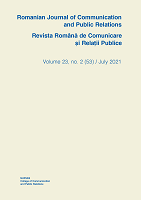The Effects of Fake News on Consumers’ Brand Trust
The Effects of Fake News on Consumers’ Brand Trust
Author(s): Gheorge-Ilie Fârte, Daniel-Rareş ObadăSubject(s): Micro-Economics, Communication studies, Behaviorism, Marketing / Advertising
Published by: Editura Comunicare.ro
Keywords: fake news; brand trust; consumer; food security;
Summary/Abstract: The aim of this study is to explore the effects of fake news on consumers’ brand trust in the food security context. The starting point of our research is the finding that issues related to food security cannot be addressed without the contribution of multinational food corporations. The efficiency of their intervention depends on their capacity to build and preserve their brand trust despite the multifarious fake news stories that contaminate the information flow. Is brand trust sensitive to fake news? In some cases, the spread of fake news in mass media and social media negatively affects food companies. In other cases, consumers’ trust remains relatively unchanged. These ambivalent reactions give us good reason to assess whether consumers’ exposure to negative fake news influences their trust in international food brands. Using a one-group pretest–posttest research design, we found that the effects of fake news on consumers’ brand trust are predominantly negative, but in a few cases, these effects can be neutral or positive. These results could be useful for PR and marketing researchers and professionals interested in fake news phenomena and brand trust because they shed light on the real threat fake news represents for multinational food companies.
Journal: Revista Română de Comunicare şi Relaţii Publice
- Issue Year: 23/2021
- Issue No: 3
- Page Range: 47-61
- Page Count: 15
- Language: English

